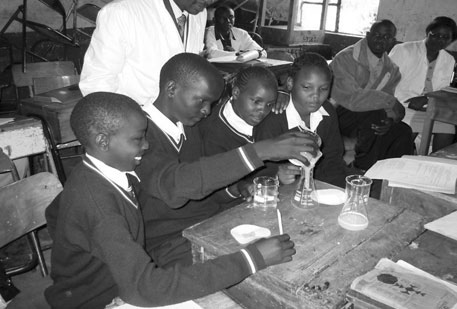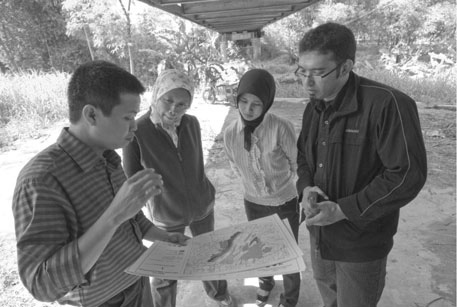Japan's Official Development Assistance White Paper 2010
Section 2 Measures for Each of the Priority Issues
The four priority issues of poverty reduction, sustainable growth, approaches to global issues, and peacebuilding are listed in the ODA Charter. This section will introduce Japan’s recent approaches to these issues.
1. Poverty Reduction
(1) Education
Education plays an important role in socio-economic development for poverty reduction. It also enables individuals to develop their own talents and capabilities, as well as to live with dignity. Education fosters understanding towards other people and of different cultures, and forms the foundation of peace. However, approximately 72 million children are unable to attend school worldwide, 54% of which are girls. The total number of adults who do not possess the minimum literacy ability is roughly 759 million people, of which approximately two-thirds are women (Note 7). The international community aims at realizing ”Education for All (EFA)” to improve this situation.
<Japan’s Efforts>
Emphasizing ”nation building” and ”human resource development,” Japan provides developing countries with wide ranging educational supports, including basic education, higher education, and technical and vocational education and training. Japan announced the ”Basic Education for Growth Initiative (BEGIN)” in 2002, based on which it provides assistance that combines both ”hard” and ”soft” aspects, such as building schools and teacher training, with the emphasis on ensuring opportunities for education, raising its quality, and improving management as priorities.
There is also the ”Fast Track Initiative (FTI),” a global framework to achieve universal primary education by 2015. As the G8 chair, Japan served as an FTI co-chair and member of its Steering Committee from January 2008, and was deeply involved in FTI debates and reform efforts. Japanese contribution to FTI-related trust funds totaled US$4.8 million from FY2007 to FY2009.
In April 2008, Japan delivered a message at the International Symposium on Self-Reliance and Sustainability of EFA (Note 8), which stressed further improvement in basic education in both quality and quantity, strengthened support for diverse educational stages beyond basic education, coordination between education and other fields, and participatory efforts that involve all people concerned in and outside Japan.
Specific initiatives during the five years from 2008 announced by Japan include: construction of about 1,000 schools (roughly 5,500 classrooms) in Africa; capacity development of about 300,000 science and mathematics teachers worldwide (including about 100,000 for Africa); and expanded initiatives for the improvement of school management for 10,000 schools in Africa. These initiatives are steadily implemented. Furthermore, in the field of literacy, Japan carries out literacy education for approximately 300,000 people in Afghanistan. It provides grant assistance of roughly ¥1.5 billion, implemented through the United Nations Educational, Scientific and Cultural Organization (UNESCO) since 2008 for a period of four years, and thereby promotes literacy education in the country.
In recent years, Japan has been supporting human resource development in developing countries through various measures such as promoting the transnational networking of institutes of higher education and joint research projects among neighboring regions and countries. Japan also accepts international students to Japanese institutes of higher education based on the ”Plan to Accept 300,000 International Students.” Japan implements International Cooperation Initiative projects, which are designed to use Japanese universities’ knowledge (their research achievements and strong capacity to train experts) to improve the quality of international cooperation. Major activities under the initiative include formulating and publicizing useful teaching materials and guidelines based on the expertise possessed by Japanese educational academies. Moreover, Japan encourages in-service teachers to go overseas as Japan Overseas Cooperation Volunteers (JOCV) under the Special Participation System for In-Service Teachers (Note 9). The in-service teachers dispatched to developing countries contribute to the development of education and the society in the field, and make use of their experience in domestic educational activities. Furthermore, in 2010, Japan established its new Education Cooperation Policy for the 2011– 2015 period — the deadline to achieve the Millennium Development Goals (MDGs).
Notes:
(7) Source: UNESCO, EFA Global Monitoring Report 2010, 2010.
(8) A symposium that was jointly sponsored by the Ministry of Foreign Affairs, Hiroshima University, and Waseda University as part of the Education for All working level meetings and related meetings held in Tokyo from April 21 to 25, 2008.
(9) The system is designed to encourage participation of in-service teachers. For example, teachers who are recommended by MEXT to JICA are exempt from the preliminary technical test, and the period of dispatch is set at two years (usually two years and three months), beginning in April and ending in March, to match the regular Japanese school year.
●Kenya: Strengthening of Mathematics and Science Education (SMASE) Project
In order to promote the development of human resources necessary for Africa’s industrial growth, Japan provides training to about 20,000 mathematics and science teachers at secondary schools in Kenya. By improving instruction methods, Japan contributes to increasing the scholastic performance of students. Furthermore, in response to requests to scale up the project to reach other African countries, Japan, through the SMASE-WECSA network (Note 10) in which Kenya has a core role, provides support for the mathematics and science education initiatives of Kenya for African countries in the region.

Kenyan children receiving mathematics and science education (Photo: JICA)
●ASEAN University Network/Southeast Asia Engineering Education Development Network (AUN/SEED-Net)
In ASEAN countries, there is growing awareness about sustainable and stable economic development and the human resources development of engineers who underpin that growth. In order to produce human resources who will contribute to the region’s industries, Japan created a network of 19 universities from 10 ASEAN countries and 11 Japanese universities and carries out programs aimed at strengthening the education and research capacities of the core universities of each country and developing human resources in the engineering field. Drawing on Japan’s expertise in the science and technology area, AUN/SEED-Net has improved the capacities of instructors and strengthened graduate school curriculums, such as through the Master’s degree and Doctoral degree programs within ASEAN and Japan for young instructors, international joint research, the instructor dispatch program, and the regional conference program, as well as contributes to promoting Japan’s science and technology diplomacy and the internationalization of universities.

SEED-Net earthquake damage assessment project team (Photo: JICA)
Notes:
(10) SMASE-WECSA: Strengthening Mathematics and Science Education (SMASE)-Western, Eastern, Central and Southern Africa.
